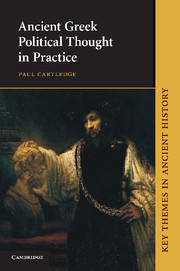Book contents
- Frontmatter
- Contents
- Preface
- Acknowledgements
- Timeline
- CHAPTERS AND NARRATIVES
- 1 Meaning in context: how to write a history of Greek political thought
- 2 The Greek invention of the polis, of politics and of the political
- Narrative I The prehistoric and protohistoric Greek world, c. 1300–750 BCE
- Narrative II The archaic Greek world, c. 750–500 BCE
- Narrative III The classical Greek world I, c. 500–400 BCE
- Narrative IV The classical Greek world II, c. 400–300 BCE
- Narrative V The Hellenistic Greek world, c. 300–30 BCE
- Narrative VI ‘Graecia capta’ (‘Greece conquered’), c. 146 BCE – CE 120
- APPENDIX I Selected texts and documents
- APPENDIX II The ‘Old Oligarch’: a close reading
- Bibliographical essay
- References
- Index
Narrative IV - The classical Greek world II, c. 400–300 BCE
Published online by Cambridge University Press: 05 June 2012
- Frontmatter
- Contents
- Preface
- Acknowledgements
- Timeline
- CHAPTERS AND NARRATIVES
- 1 Meaning in context: how to write a history of Greek political thought
- 2 The Greek invention of the polis, of politics and of the political
- Narrative I The prehistoric and protohistoric Greek world, c. 1300–750 BCE
- Narrative II The archaic Greek world, c. 750–500 BCE
- Narrative III The classical Greek world I, c. 500–400 BCE
- Narrative IV The classical Greek world II, c. 400–300 BCE
- Narrative V The Hellenistic Greek world, c. 300–30 BCE
- Narrative VI ‘Graecia capta’ (‘Greece conquered’), c. 146 BCE – CE 120
- APPENDIX I Selected texts and documents
- APPENDIX II The ‘Old Oligarch’: a close reading
- Bibliographical essay
- References
- Index
Summary
Two of Socrates' former pupils, Xenophon and Plato, drew unambiguously negative lessons from the outcome of Socrates' trial: democracy, they believed, or at any rate democracy Athenian-style, was an irredeemably bad thing. In the real world, however, democracy achieved its widest reach and most powerful embrace precisely during the first half of the fourth century bce. True, the democracies that were either now established for the first time, or re-established, perhaps after yet another bout of stasis, very rarely belonged to the species that Aristotle was to dub the ‘last’ or most extreme version of democracy. They were, instead, more or less ‘moderate’ democratic regimes, combining features of pure unfettered democracy, people-power, with more or less oligarchic features of government such as the imposition of a property qualification for eligibility to hold office or/and the use of election (not the lottery) to fill the highest executive offices.
Two of the most striking of the ‘new’, fourth-century democracies were the island state of Chios and the landlocked polis of Thebes, both of which would also become founder members of the Athenians' Second, mainly naval, League, which was established exactly a century after the First, in 378. Thucydides (8.24) had praised the Chian oligarchy of the fifth century for its self-restraint and stability amid prosperity; presumably by that he meant that the richest few Chiots had not abused their position of wealth and power by unduly exploiting or politically oppressing the masses.
- Type
- Chapter
- Information
- Ancient Greek Political Thought in Practice , pp. 91 - 95Publisher: Cambridge University PressPrint publication year: 2009

